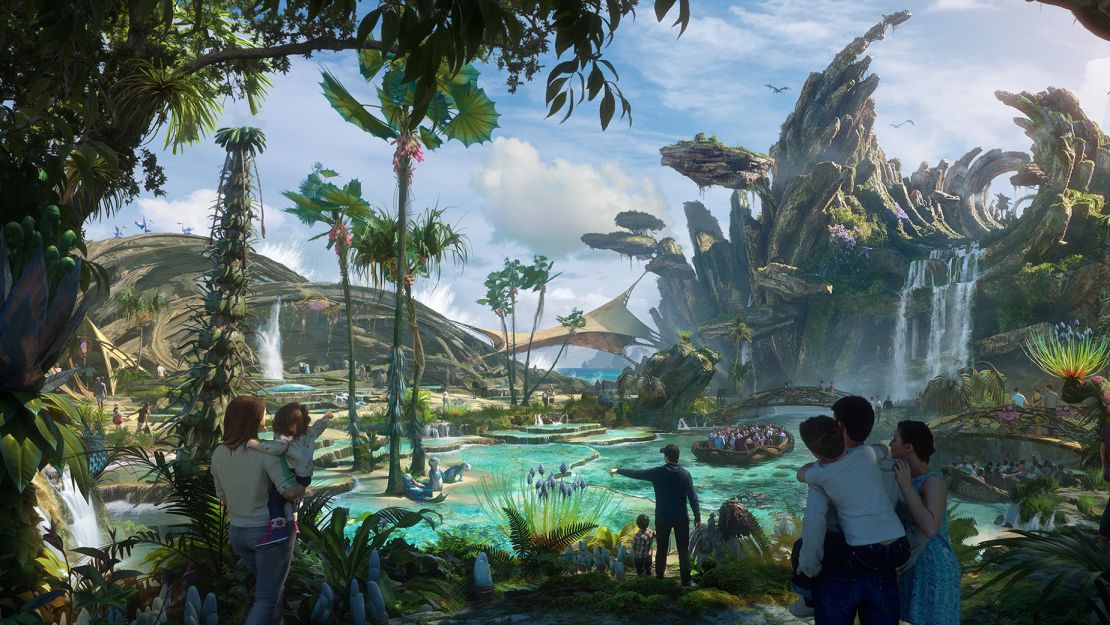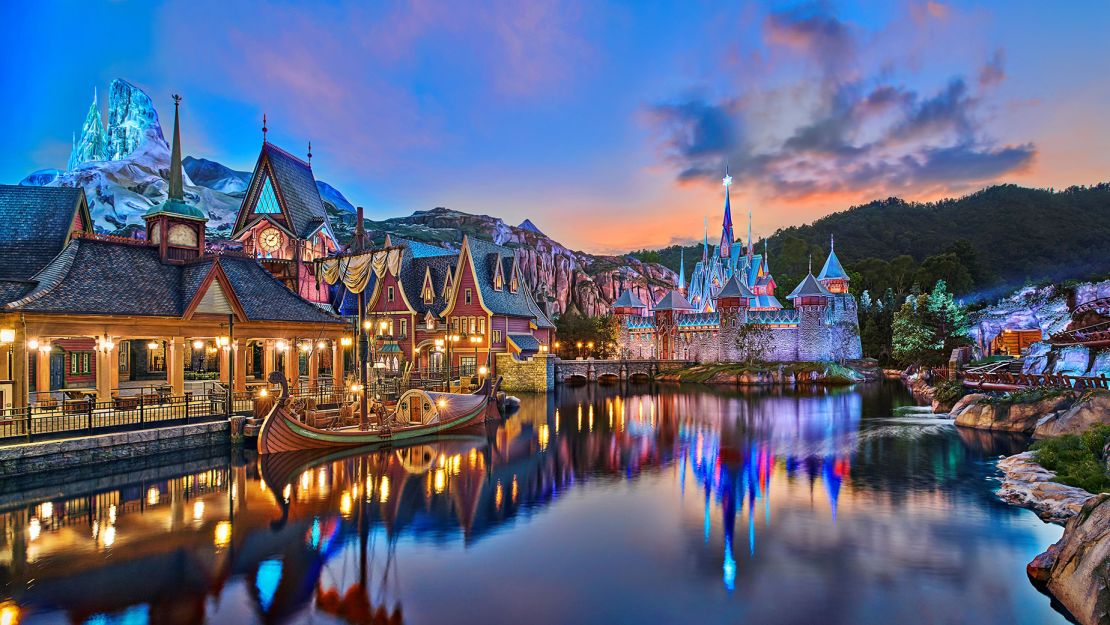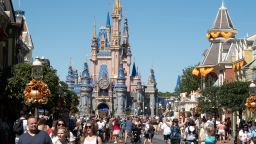Disney cleared a major hurdle to start developing a colossal expansion of its Disneyland theme parks on Tuesday night when the Anaheim city council unanimously gave final approval to rezone much of the property.
Disney’s original resort in California, which comprises a shopping district, parking areas and two theme parks, is about 550 acres, which is less than 2% of the size of Walt Disney World in Florida.
But with newly approved “multi-use” zoning, Disney can now expand its theme parks in Anaheim without acquiring any new land, by building attractions where the company could previously only build hotels or parking lots.?This paves the way for a multi-decade project to expand both of its theme parks there: Disneyland and Disney California Adventure.
“For nearly seven decades, Disneyland Resort has made a unique, irreplaceable impact on hundreds of millions of guests from around the world. How exciting to know our best days are still ahead – I can’t wait to show you what’s to come,” Disneyland Resort President Ken Potrock said in a statement Tuesday night.
The project, dubbed “DisneylandForward,” does not require any public funding. While no specific designs have been shared yet, Disney has released concept art for what the expansion could look like on the west side of the resort, in areas surrounding Disneyland Hotel and Pixar Place Hotel.

“This is long overdue – this is decades overdue. This, in my opinion, is the biggest thing Disney has done since they opened the gate in ’55,” said Dennis Speigel, owner and founder of International Theme Park Services, a global consultant for theme park projects.
Speigel, who is not involved in Disney’s plans, said this project could allow Disneyland Resort to go from an estimated 25 million visits per year to 40 million over the next 20 years.
“You’re going from a two-room house to a five-room house,” Speigel said, adding that visitors will be much more comfortable in the expanded space and increase per capita spending by staying longer to experience more attractions.
What will the new areas look like?
Disney CEO Bob Iger said during a shareholders’ meeting in April that DisneylandForward’s potential new projects could include “the opportunity to embark on all-new Avatar adventures with a visit to the world of Pandora.”
The released concept art for a possible Avatar land shows a space similar to Pandora in Disney’s Animal Kingdom in Florida, but with guests on boats in the middle of an open lake, a look evoking the franchise’s second film, “The Way of Water.”
In a video posted by Disney in January, Rachel Alde, Disney Experiences senior VP of global development, said a 1990s agreement with the city of Anaheim permitted Disney to build 6.8 million square feet of theme park space, but the company has only built 46% of that due to restrictions in space and zoning.
“Just imagine what we could do with this space. Right now, it’s surface parking lots. But what if we could become the first-ever land based on Wakanda, from the Black Panther franchise? A land based on Zootopia leveraging the work you saw earlier at Shanghai Disney Resort. The creation of Arendelle from Frozen, similar to what you saw at three of our international parks. Or even the opportunity to celebrate Dia de los Muertos, in a Coco-themed land resonating with the diverse community in Southern California.”

‘Disneyland will never be completed’
Don Ballard, an author and historian who wrote a book on the historic Disneyland Hotel, said the company’s original resort is “ever evolving. I mean, you know, the technology changes, people’s tastes change.”
Ballard brought up a famous quote by Walt Disney: “Disneyland will never be completed. It will continue to grow as long as there is imagination left in the world.”
Todd James Pierce, a Cal Poly San Luis Obispo professor who wrote the book “Three Years in Wonderland” on the making of Disneyland, said, “When Walt was alive, almost every year there was a new attraction, if not multiple new attractions. The one break is right around the World’s Fair, because he was busy doing other things. But this gives the Disneyland Resort the land to really expand in that way … So if people are fans, there’s going to be something new not too long from now, every year, every couple of years.”

Pierce said that what’s interesting about the concept art they’ve chosen is “none of these things are standalone attractions. They’re all 8- to 12-acre themed environments, usually around one or related [stories],” like an entire Frozen land.
Ballard and Pierce both believe that beyond creating something imaginative, the new project is also practical in relieving crowds in the compact resort.
Ballard, who proposed to his wife at Disneyland, joked, “It was just me and 80,000 of my closest friends. And I asked her to marry me in front of the castle, and four girls behind her said ‘yes.’”
Pierce said that by having new lands open, Disney can also more easily close existing attractions to redevelop them, because guests can spread out and not be forced into tight crowds.
How to keep it in the ‘bubble’
Disney theme parks around the world are known for creating an immersive atmosphere, where a visitor leaves the “real” world for something fantastical. To do so requires a “Disney bubble,” as fans call it, where one is shielded from the outside world.
But there will be a challenge with this project because part of the land that could be redeveloped is separate from the main Disneyland Resort campus. Disney has shown in concept art that one piece of land on the east side, which is currently the Toy Story surface parking lot, could be turned into a mixed-use hotel, restaurant and shopping district similar to Disney Springs in Florida.
To get from the main theme parks to this shopping area requires crossing city streets with 7-Elevens and CVS drugstores, Pierce said.
The challenge is “not in doing what they do really well, which is build themed environments, but figuring out how to connect up this patchwork of property that they’ll now control,” Pierce said. “Elevated walkways, a people mover system or a Skyliner system (the elevated gondolas), something like that…is probably going to be necessary, otherwise the vacation experience becomes fragmented.”
The DisneylandForward project includes approval for pedestrian bridges over city streets, but anything else would require separate city approval, according to Mike Lyster, chief communications officer for the city of Anaheim.
Another concern is making sure there’s enough parking. By potentially building theme park lands on top of what are currently parking lots, Disney would need to create new parking accommodations elsewhere around the resort. Disney has said it envisions building a new parking location on the east side of the resort, which would include one to three pedestrian bridges with upgraded entrance accessibility for hotels and businesses along Harbor Boulevard.
A 40-year promise
Tuesday’s rezoning approval will go into effect in 30 days. Next,?Disney and the city of Anaheim will?finalize?a development agreement that would be good until 2064.
“This is a milestone for the city. We’re looking at a unique opportunity not just for Anaheim, but for the state of California,” said Ashleigh Aitken, the mayor of Anaheim.
The agreement, which is likely to be finalized in the coming week,?includes?Disney committing $1.9 billion to the project in the first 10 years, paying $40 million to take over two streets currently owned by the city, paying $45 million for transportation improvements, contributing $8 million for city parks, and contributing $30 million for affordable housing.
Speigel said he believes the company will exceed the initial investment promise and spend more than $3 billion.
This?expansion project?comes as the company had previously announced a $60 billion investment in its parks and cruises around the world over the next 10 years.
Aitken said more than 50% of the city of Anaheim’s general fund comes from dollars generated in the tourism industry. So not only would the project transform the guest experience, it would also result in a major investment in the city.
She also said she has been one of the “fiercest critics” of expansion in the resort district, opposing city subsidies and ensuring the project’s support from construction and hospitality unions.
“And I’m comfortable that the Disneyland team has answered a lot of those concerns.”
Aitken said the resulting proposal is well thought-out and a “win-win” for everyone.


